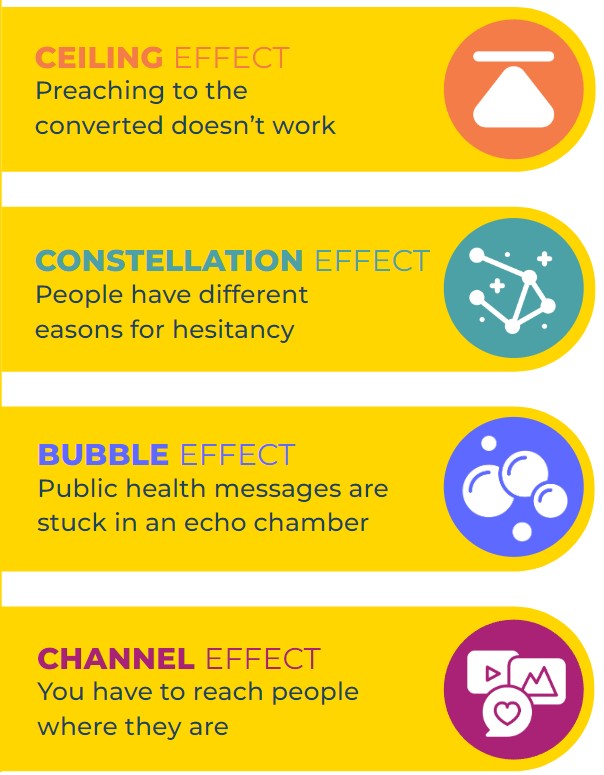RSV protection: Learn what’s available in your province
We bring together an interdisciplinary team of researchers, clinicians, community partners, and community members to gather, interpret, and use insights to gain a holistic perspective and understand people’s behaviours and attitudes toward various health topics.
Over the years, we have conducted 60+ population-based surveys, 100+ focus groups and interviews, and analyzed over 8 million social media posts. We work with community partners to tailor surveys and interview guides to meet the needs of diverse populations.
We also provide consultation with public health professionals & subject matter experts to develop and translate insights.

Through population-based surveys we understand the needs of segments of the population.
Over the past four years, we have polled over 100,000 Canadians to understand public sentiment related to various health topics.
During the pandemic, we conducted weekly polling with the University of Toronto to understand public sentiment related to various health topics.
We explore the lived experiences and personal perspectives of specific populations through virtual and in-person interviews and focus groups.
Working with community partners, we conduct research activities in first languages to make participation more inclusive.
We synthesize existing insights through literature reviews, environmental scans, and scoping reviews.
Using machine learning and natural language processing, we are able to map and understand themes that emerge online related to relevant health topics.
We completed a survey to understand parents’ attitudes and beliefs related to measles, mumps and rubella vaccination.
We found that MMR vaccination is driven mostly by perceptions about the vaccine rather than threat perceptions related to measles, mumps and rubella.
Trust is centrally important in explaining MMR vaccine status, especially among those that consistently do not vaccinate their children. Credible information exposure (such as from providers) and knowledge help even after controlling for trust.
These insights informed our Power Up! Campaign aimed to increase awareness about missed MMR vaccinations throughout the COVID-19 pandemic.
We conducted a survey with 842 parents and 2 focus groups with recently, currently or soon to be pregnant parents to understand their current knowledge, awareness and beliefs related to RSV immunizations.
We found that while awareness of RSV and associated risks are high, few respondents were aware of maternal and infant immunizations.
These insights were used to inform a national RSV immunization awareness campaign.
We conducted a scoping review to determine which HPV self-sampling implementation and engagement strategies have been used to engage under screened populations (i.e., Indigenous, newcomer, and rural and remote communities) in cervical cancer screening.
Across 26 studies, we found that in-person engagement with trusted community leaders was the most widely used and accepted recruitment and engagement strategy across all three populations.
These findings informed our approach to training community health ambassadors to support Alberta’s HPV self-sampling pilot.
We conducted a survey with 1,435 Canadian women and 5 focus groups with priority populations and found that women are concerned about heart and brain health, but are unaware of age specific risk factors for cardiovascular disease.
These insights were used to inform the Heart & Stroke Foundation’s women’s campaign
We conducted a survey with 7,000 adults from Brazil, Canada, France, India, Nigeria, The United Kingdom and the United States to understand their perspectives and trust in COVID-19, influenza, HPV and pneumococcal vaccines.
We found that vaccine trust was highest in Brazil, India and Nigeria. To compliment this work, we also analyzed over 1 million tweets about the 4 vaccines across the same 7 countries and explored how social media discourse varies by country and vaccine.
These insights can be used to inform the tailoring of public health messaging for each country and vaccine based on their current perspectives.
We conducted 8 first-language focus groups with newcomer parents of school-aged children to understand RCV uptake among newcomers before and after the pandemic.
We found that parents are generally supportive of getting their children vaccinated but struggle with:
These insights informed the development of vaccine education materials in multiple languages which are now included in settlement services information packages for newcomers.
Using deep-learning modeling of natural language processing, we analyzed Twitter data on a weekly basis to explore the discourse related to COVID-19 vaccines.
We identified vaccine hesitant and vaccine confident networks and found that vaccine hesitancy was often fueled by mistrust in institutions and how deeply political the nature of COVID-19 vaccines were during the pandemic. In most cases, this was a greater concern than vaccine safety.
These insights were shared with public health leaders to inform vaccine communication.
We conducted virtual focus groups with Canadians across Canada to understand their attitudes and behaviours towards COVID-19 vaccinations in efforts to put forth recommendations for public health messaging.
Our team conducted weekly surveys of Canadians (n = ~2000/week) throughout 2020 to monitor COVID-19 public sentiment in partnership with the University of Toronto’s Munk School of Global Affairs & Public Policy. We found that there are four effects most important to consider in public health behaviour change efforts. These effects included:
CEILING EFFECT
Preaching to the
converted doesn’t work
CONSTELLATION EFFECT
People have different
reasons for hesitancy
BUBBLE EFFECT
Public health messages are stuck in an echo chamber
CHANNEL EFFECT
You have to reach people where they are

Memedovich A, Orr T, Hollis A, Salmon C, Hu J, Zinszer K, Williamson T, Beall RF. Social network risk factors and COVID-19 vaccination: A cross-sectional survey study. Vaccine. 2024 Feb 6;42(4):891-911.
Doucette EJ, Fullerton MM, Pateman M, Lip A, Houle SK, Kellner JD, Leal J, MacDonald SE, McNeil D, Tyerman J, Luctkar-Flude M. Development and evaluation of virtual simulation games to increase the confidence and self-efficacy of healthcare learners in vaccine communication, advocacy, and promotion. BMC Medical Education. 2024 Feb 25;24(1):190.
Moss SJ, Stelfox M, McArthur E, Sriskandarajah C, Ahmed SB, Birnie K, Halperin DM, Halperin SA, Harley M, Hu J, Kamstra JN. Social factors associated with self-reported changes in mental health symptoms among youth in the COVID-19 pandemic: a cross-sectional survey. BMC Public Health. 2024 Feb 28;24(1):631.
Fullerton MM, Ford C, D’Silva C, Chiang B, Onobrakpor SI, Dievert H, Yang H, Cabaj J, Ivers N, Davidson S, Hu J. HPV self-sampling implementation strategies to engage under screened communities in cervical cancer screening: a scoping review to inform screening programs. Frontiers in Public Health. 2024 Aug 26 12, 1430968.
Doucette EJ, Pateman M, Fullerton MM, Lip A, Houle SK, Kellner JD, Leal J, MacDonald SE, McNeil D, Davidson S, Constantinescu C. “You can push these conversations, but don’t push your patient away”: healthcare learner perspectives on virtual simulation games as an educational approach to address vaccine hesitancy. Frontiers in Public Health. 2024 Jul 3;12:1408871.
D’Silva C, Fullerton MM, Hu J, Rabin K, Ratzan S. A Global Survey to Understand General Vaccine Trust, COVID-19 and Influenza Vaccine Confidence. Frontiers in Public Health. 2024 Oct 13;12:1406861.
Lip A, Pateman M, Fullerton MM, Chen HM, Bailey L, Houle S, Davidson S, Constantinescu C. Vaccine hesitancy educational tools for healthcare providers and trainees: a scoping review. Vaccine. 2023 Jan 4;41(1):23-35.
Mourali M, Benham JL, Lang R, Fullerton MM, Boucher JC, Cornelson K, Oxoby RJ, Constantinescu C, Tang T, Marshall DA, Hu J. Persuasive messages for improving adherence to COVID-19 prevention behaviors: Randomized online experiment. JMIR Human Factors. 2023 Feb 13;10:e41328.
Leigh JP, Moss SJ, Sriskandarajah C, McArthur E, Ahmed SB, Birnie K, Halperin D, Halperin S, Harley M, Hu J, Ng Kamstra J. A muti-informant national survey on the impact of COVID-19 on mental health symptoms of parent–child dyads in Canada. Scientific Reports. 2023 May 17;13(1):7972.
Moss SJ, Racine N, Ahmed S, Birnie K, Cherak MS, Curran JA, Halperin D, Halperin SA, Harley M, Hu J, Leppan L. Codesigning a user-centred digital psychoeducational tool for youth mental well-being with families in Canada: study protocol for a sequential exploratory mixed methods study. BMJ open. 2023 Jun 1;13(6):e072533.
Fullerton MM, Pateman M, Hasan H, Doucette EJ, Cantarutti S, Koyama A, Weightman AM, Tang T, Coakley A, Currie GR, Fabreau G. Barriers experienced by families new to Alberta, Canada when accessing routine-childhood vaccinations. BMC Public Health. 2023 Jul 12;23(1):1333.
Memedovich A, Farkas B, Hollis A, Salmon C, Hu J, Zinszer K. COVID-19 Vaccine’s Speed to Market and Vaccine Hesitancy: A Cross-Sectional Survey Study. Healthcare Policy. 2023 Aug 1;19(1).
Fullerton MM, Benham J, Graves A, Fazel S, Doucette EJ, Oxoby RJ, Mourali M, Boucher JC, Constantinescu C, Leigh JP, Tang T. Challenges and recommendations for COVID-19 public health messaging: a Canada-wide qualitative study using virtual focus groups. BMJ open. 2022 Apr 1;12(4):e054635.
Maharaj AS, Parker J, Hopkins JP, Gournis E, Bogoch II, Rader B, Astley CM, Ivers NM, Hawkins JB, Lee L, Tuite AR. Comparison of longitudinal trends in self-reported symptoms and COVID-19 case activity in Ontario, Canada. PloS one. 2022 Jan 11;17(1):e0262447.
Yeo J, Gudmundsen CF, Fazel S, Corrigan A, Fullerton MM, Hu J, Jadavji T, Kuhn S, Kassam A, Constantinescu C. A behavior change model to address caregiver hesitancy around COVID-19 vaccination in pediatrics. Vaccine. 2022 Sep 16;40(39):5664-9.
Corrigan A, Constantinescu C. The looming hurdle of hesitancy: empowering clinicians to hold the COVID-19 vaccine discussion. Canadian Family Physician. 2022 Jun 1.
Lazarus JV, Wyka K, White TM, Picchio CA, Rabin K, Ratzan SC, Parsons Leigh J, Hu J, El-Mohandes A. Revisiting COVID-19 vaccine hesitancy around the world using data from 23 countries in 2021. Nature communications. 2022 Jul 1;13(1):1-4.
Tetui M, Grindrod K, Waite N, VanderDoes J, Taddio A. Integrating the CARD (Comfort Ask Relax Distract) system in a mass vaccination clinic to improve the experience of individuals during COVID-19 vaccination: a pre-post implementation study. Human Vaccines & Immunotherapeutics. 2022 Jun 20:2089500.
Gao G, Lang R, Oxoby RJ, Mourali M, Sheikh H, Fullerton MM, Tang T, Manns BJ, Marshall DA, Hu J, Benham JL. Drivers of downloading and reasons for not downloading COVID-19 contact tracing and exposure notification apps: A national cross-sectional survey. Plos one. 2022 Jul 15;17(7):e0269783.
Carey JM, Guess AM, Loewen PJ, Merkley E, Nyhan B, Phillips JB, Reifler J. The ephemeral effects of fact-checks on COVID-19 misperceptions in the United States, Great Britain and Canada. Nature Human Behaviour. 2022 Feb;6(2):236-43.
Lazarus JV, Romero D, Kopka CJ, Karim SA, Abu-Raddad LJ, Almeida G, Baptista-Leite R, Barocas JA, Barreto ML, Bar-Yam Y, Bassat Q. A multinational Delphi consensus to end the COVID-19 public health threat. Nature. 2022 Nov 10;611(7935):332-45.
Lang R, Benham JL, Atabati O, Hollis A, Tombe T, Shaffer B, Kovacs Burns K, MacKean G, Léveillé T, McCormack B, Sheikh H, Fullerton MM, Tang T, Boucher JC, Constantinescu C, Mourali M, Manns BJ, Marshall DA, Hu J, Oxoby RJ. Attitudes, behaviours and barriers to public health measures for COVID-19: a survey to inform public health messaging. BMC Public Health. 2021. 21, 765. https://doi.org/10.1186/s12889-021-10790-0
Benham JL, Atabati O, Oxoby RJ, Mourali M, Shaffer B, Sheikh H, Boucher JC, Constantinescu C, Leigh JP, Ivers NM, Ratzan SC. COVID-19 vaccine–related attitudes and beliefs in Canada: National cross-sectional survey and cluster analysis. JMIR public health and surveillance. 2021 Dec 23;7(12):e30424.
Boucher JC, Cornelson K, Benham JL, Fullerton MM, Tang T, Constantinescu C, Mourali M, Oxoby RJ, Marshall DA, Hemmati H, Badami A, Hu J, Lang R. (2021). Analyzing Social Media to Explore the Attitudes and Behaviors Following the Announcement of Successful COVID-19 Vaccine Trials: Infodemiology Study. JMIR Infodemiology. 12;1(1):e28800. doi: 10.2196/28800.
Grindrod K, Waite N, Constantinescu C, Watson KE, Tsuyuki RT. COVID-19 vaccine hesitancy: Pharmacists must be proactive and move the middle. Canadian Pharmacists Journal/Revue des Pharmaciens du Canada. 2021 May;154(3):133-5.
Ladha MA, Luca N, Constantinescu C, Naert K, Ramien ML. Response to Reader Comment Regarding “Approach to Chilblains During the COVID-19 Pandemic”. Journal of Cutaneous Medicine and Surgery. 2021 May;25(3):344-5.
Duch R, Roope LS, Violato M, Fuentes Becerra M, Robinson TS, Bonnefon JF, Friedman J, Loewen PJ, Mamidi P, Melegaro A, Blanco M. Citizens from 13 countries share similar preferences for COVID-19 vaccine allocation priorities. Proceedings of the National Academy of Sciences. 2021 Sep 21;118(38):e2026382118.
Bridgman A, Merkley E, Zhilin O, Loewen PJ, Owen T, Ruths D. Infodemic pathways: Evaluating the role that traditional and social media play in cross-national information transfer. Frontiers in Political Science. 2021:20.
Yeo J, Gudmundsen C, Fazel S, Corrigan A, Fullerton M, Gagneur A, Hu J, Jadavji T, Kuhn S. 80 Archetypes of vaccine hesitant caregivers towards COVID-19 immunization during a global pandemic: A qualitative study. Paediatrics & Child Health. 2021 Oct;26(Supplement_1):e58-9.
Desveaux L, Savage RD, Tadrous M, Kithulegoda N, Thai K, Stall NM, Ivers NM. Beliefs associated with intentions of non-physician healthcare workers to receive the COVID-19 vaccine in Ontario, Canada. medRxiv. 2021 Jan 1.
Lang R, Atabati O, Oxoby RJ, Mourali M, Shaffer B, Sheikh H, Fullerton MM, Tang T, Leigh JP, Manns BJ, Marshall DA. Characterization of non-adopters of COVID-19 non-pharmaceutical interventions through a national cross-sectional survey to assess attitudes and behaviours. Scientific reports. 2021 Nov 5;11(1):1-4.
Merkley E, Loewen PJ. Anti-intellectualism and the mass public’s response to the COVID-19 pandemic. Nature Human Behaviour. 2021 Jun;5(6):706-15.
Brankston G, Merkley E, Fisman DN, Tuite AR, Poljak Z, Loewen PJ, Greer AL. Socio-demographic disparities in knowledge, practices, and ability to comply with COVID-19 public health measures in Canada. Canadian Journal of Public Health. 2021 Jun;112(3):363-75.
Merkley E, Loewen PJ. Assessment of communication strategies for mitigating COVID-19 vaccine-specific hesitancy in Canada. JAMA network open. 2021 Sep 1;4(9):e2126635-.
Ladha MA, Luca N, Constantinescu C, Naert K, Ramien ML. Approach to chilblains during the COVID-19 pandemic. Journal of Cutaneous Medicine and Surgery. 2020 Sep;24(5):504-17.
Bridgman A, Merkley E, Loewen PJ, Owen T, Ruths D, Teichmann L, Zhilin O. The causes and consequences of COVID-19 misperceptions: Understanding the role of news and social media. Harvard Kennedy School Misinformation Review. 2020 Jun 18;1(3)
Merkley E, Bridgman A, Loewen PJ, Owen T, Ruths D, Zhilin O. A rare moment of cross-partisan consensus: Elite and public response to the COVID-19 pandemic in Canada. Canadian Journal of Political Science/Revue canadienne de science politique. 2020 Jun;53(2):311-8.
Sevi S, Aviña MM, Péloquin-Skulski G, Heisbourg E, Vegas P, Coulombe M, Arel-Bundock V, Loewen PJ, Blais A. Logarithmic versus linear visualizations of COVID-19 cases do not affect citizens’ support for confinement. Canadian Journal of Political Science/Revue canadienne de science politique. 2020 Jun;53(2):385-90.
Teichmann L, Nossek S, Bridgman A, Loewen PJ, Owen T, Ruths D, Zhilin O. Public health communication and engagement on social media during the COVID-19 pandemic. 2020.
Aghajafari F, Hansen B, McBrien K, Leslie M, Chiew A, Ward R, Li B, Hu J. The primary care COVID-19 integrated pathway: a rapid response to health and social impacts of COVID-19. BMC Primary Care. 2022 Dec;23(1).
Praxus health works closely with a broad, multidisciplinary group of partners, who help provide expertise across the full range of Praxus Healths activities. From polling and data analysis, to community outreach, to communications, and everything in between, this diverse coalition drives the work of Praxus Health.

Whether you’re a community leader, healthcare professional, or simply passionate about improving health outcomes, there are many ways to get involved with Praxus Health. Together, we can transform healthcare for everyone.
Hear from our satisfied clients about the transformative power of our recreational therapy services.